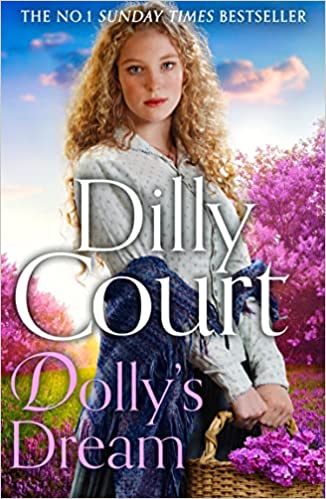You are viewing your 1 free article this month. Login to read more articles.
Dilly Court in conversation about how her experiences have built her successful career as a writer
Court up in the romance: bestseller Dilly Court’s lifetime of experience and perseverance built the foundation
of her novel-writing success.
Dilly Court is giving me a tour of her Weymouth home when the saga superstar asks if I want “a peek into the Cupboard of Sin”. In a romantic fiction context that question might conjure a plethora of possibilities, but it is the place she stores copies of the dozen manuscripts that were rejected when she first tried to make it as a writer.
Being an author was a dream long-deferred for this natural storyteller, who from an early age wrote constantly. But some knocks in life—not least a difficult first marriage—got in the way and it was not until her mother’s funeral, when Court was in her mid-50s, that she properly decided to give it a go. Court explains: “My mother was a poet who wrote all her life, but used to tear up the poems after she finished them. She only had one poem published and my brother read it at her funeral. She had written it in the war as a young bride with her husband away; it was beautiful. But I thought, ‘Well, my mother wanted to be a writer and I know I can be one.’”
She then brings me into the “Engine Room”, Court’s sun-lit, well-used office, her desk a-scatter with history books, reference tomes and a print-out of her previous day’s words. After some rough and tumble with Bertie and Shadow—her and granddaughter Millie’s aggressively affectionate dogs—we talk further about Court’s career. Shadow’s presence lingers, though, as the border collie spends the bulk of the interview banished to the conservatory but looking heartbreakingly optimistically our way, a ball in his muzzle.
There was no instant success for Court, as the Cupboard of Sin attests. But she honed her craft assiduously and forensically, hoovering up books on writing, dog-earing the Writers’ & Artists’ Yearbook, once hiring a literary consultant to work with her on a manuscript and constructing a chart of feedback notes. She says: “I think every big publisher said no to me. It was rejection after rejection but I could tell I was getting better: the feedback was becoming kinder and I learned from each miss.”
Then things came together quickly, with two agencies, Darley Anderson and Teresa Chris, keen to sign Court up. Chris—who won out—previously turned down one of Court’s earlier manuscripts with a note: “I am rejecting this but I think I will regret it in the future.” The agent then quickly had Orion and Arrow bidding for Court’s début, with the Random House imprint winning, publishing Mermaids Singing at the tail end of 2005. Court’s original acquiring editor—Kate Elton, now m.d. across a number of HarperCollins divisions—would eventually help lure the author over to HC[HarperCollins] a decade later.
I think the climate is getting better but the popular always gets looked down upon, doesn’t it?
Mermaids Singing sold well—the 2006 paperback shifted 45,000 units through BookScan—but it was not a monster hit. But book-by-book Court built an audience, bagging her first Mass-Market number one in 2020 with A Village Scandal, and claiming her initial overall UK top spot last summer with Sunday’s Child, the fourth in her largely Devon-set Rockwood Chronicles. “It was a lovely surprise and I was really pleased to push Richard Osman off the telly from the top,” she says with a smile (Sunday’s Child ended The Man Who Died Twice’s six-week run at number one). Court did not quite hit those heights with last week’s launch of Dolly’s Dream, but it still bagged the Mass-Market Fiction number one and claimed third position in the Official UK Top 50 (see Data, pp30–35).
Unsung heroine
All told, Court has sold an impressive 4.1 million-plus units through BookScan, for £17.5m. And yet, she just might be the most low-key superstar author in Britain today. There are relatively few profiles of her in the wider media—and believe me, this is not for lack of trying by the HC publicity machine. Even the local press, who you might think would shout loudest, seem oblivious. The Dorset Echo ran a piece two years ago about Court donating money to charity, styling her (under her real name) “Delys Curthoys, an author living in Weymouth”.
Court says there are no film or TV types sniffing around her work, which is a head-scratcher to me as her books seem eminently adaptable with their combination of compelling and relatable real-life grit and aspirational romantic historical fantasy. The eras, settings and characters change but there are recurring leitmotifs: smart and beautiful heroines rebelling against societal constraints, triumphing over precarious living situations and feckless (sometimes abusive) men, until they can carve their own path and find true love along the way.
I’ve started appreciating when people don’t ask about my age. I was doing an interview when this young woman said, ‘You’re 82 now?’ And I said ‘Yes.’ And she said, ‘I guess you won’t be around much longer then.’ How do you respond to something like that?
Let’s not be disingenuous, part of the reason for the lack of wider recognition is that Court writes in a sub-genre of a sometimes disrespected category. That lack of respect chafes, but Court takes it in her stride: “I think the climate is getting better but the popular always gets looked down upon, doesn’t it? Across the arts: classical music buffs will sniff at Tchaikovsky. I daresay there are some terrible romance and saga writers. There are terrible writers in all genres, but [romance authors] seem to be a bit more overlooked.”
There might be a bit of ageism, too. Court turns 83 this June and I had made a decision not to raise the topic, but she is only too aware of it—after all, when she got her first deal she shaved five years off her age and told Arrow she was 60. But Court brings it up: “I’ve started appreciating when people don’t ask about my age. I was doing an interview when this young woman said, ‘You’re 82 now?’ And I said ‘Yes.’ And she said, ‘I guess you won’t be around much longer then.’ How do you respond to something like that? I was doing an event when a lady asked me: ‘How does it feel to be facing death?’ I had to laugh. I said: ‘It’s like driving a car very fast at a brick wall and you haven’t any brakes.’”
Writing from experience
If the trials and tribulations of her heroines ring true, Court has a simple explanation: “It happened to me.” She was born during the war in north-east London and had a fairly privileged background, but in true saga fashion disaster struck when her father fell out with the rest of his family, was cut out of their successful furniture business and was left penniless. Her parents moved to north Wales to run a pub while Court, then in her late teens, stayed behind in London and tried to make it as a copywriter and a TV scriptwriter. It was a struggle, with Court occasionally having to move in with her parents when the money ran out: “It was London in the Swinging Sixties, but I was too poor and too busy working to be part of it.”
I was always too busy looking after children on my own and just surviving, really
She ended up marrying a dashing merchant sea captain, moved to the south-west coast and the couple had two children—but all was not well. Her husband had a drink problem and there was an almost continual cycle of him returning from sea flush with cash but frittering it—and more besides—away. Court says: “And then once he just didn’t come back, leaving me to go bankrupt for all his debts.”
She persevered, raising her kids while working in hospital administration, and later meeting her second, happily-ever-after husband. She concludes: “I remember writing my first book when I was 13—I’ve always been drawn to the historical and it was very Georgette Heyer—and had tried to write ever since. But I was always too busy looking after children on my own and just surviving, really. After I met my current husband, I took early retirement because we could afford to. That gave me the opportunity to finally be able to do this seriously as a career. So, I made sure I took it.”











